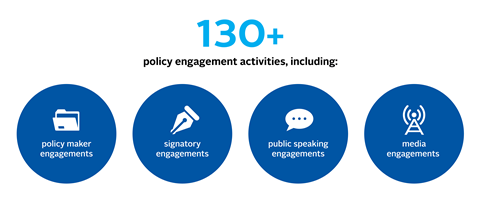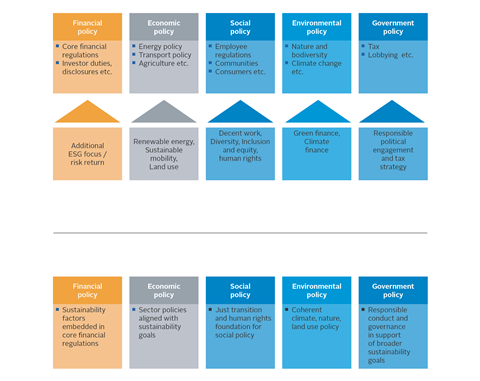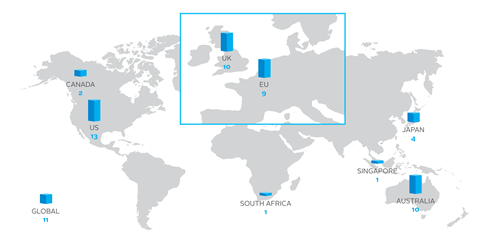
Message from Nathan Fabian, Chief Sustainable Systems Officer
In the PRI in a Changing World consultation, a majority of signatories told us that the actions of the responsible investment community should contribute to sustainable environmental and social outcomes, aligned with their fiduciary responsibilities.
To support these ends, we must empower signatories in their interactions – not only with investees and beneficiaries, but with capital markets and a transitioning economy. This requires that we treat finance, the economy, our environment and society as an interconnected system, and focus on the meaningful, proportionate roles that our broad tent of responsible investors play in this system.
We have already built capability on sustainability issues, financial policy and regulation reform, meaningful data and links with academia. We have delivered research, analysis, guidance and thought leadership across programmes, addressing: particular ESG issues (including climate change mitigation, nature, human rights and taxation); systemic issues such as how to drive meaningful ESG data through markets and how to align financial systems with sustainability; and responsible investment practice, including stewardship activities and ESG integration across asset classes.
Much of this work informs our support for signatories in collaborative engagements, policy advice and submissions to governments, and in tools and frameworks for signatories to use in their responsible investment activities. Leveraging the expertise and support of partner organisations is crucial to many of our highest profile research activities – such as the Inevitable Policy Response programme, A Legal Framework for Impact and the Taskforce on Nature-related Financial Disclosures – and will continue to be so.
We must treat finance, the economy, our environment and society as an interconnected system, and focus on the meaningful, proportionate roles that our broad tent of responsible investors play.
Analysing the future of responsible investment
The Sustainable Systems team will bring all our systems activity together, to build a common view of change priorities for financial markets and economic transition. The team will look forward, innovate, and guide the PRI on responsible investment’s future, ensuring that our various activities to support signatories contribute to achieving a sustainable financial system and a more sustainable world.
A financial system that operates within planetary boundaries and promotes human rights and equitable societies needs to assess and track its performance. To support investors to understand how their activities magnify or reduce financial risks and support investment value, we will continue to research the link between financial system function and real economy sustainability performance. This will include identifying and advancing the most promising work from signatories, governments and other actors to help guide responsible investment activities across the signatory base.
We will continue to build our academic network, curating and translating the best insights from academic research for a practitioner audience.
Understanding and shaping the policy environment
As financial markets reform to incorporate sustainability factors, we see rapid changes in regulatory design. As a global organisation, with operations in many countries and signatories in nearly 100, we are well placed to both contribute to, and share insights on, how financial regulation is developing and how financial and economic policy align with each other and with sustainability goals. We will continue to develop a global policy team to lead on international and multilateral engagement, and to lay out high-level priorities for the PRI’s local policy teams building Responsible Investment Ecosystems.
Supporting signatory progression
As responsible investment matures, signatories are taking ever more diverse approaches, reflecting their unique regulatory environments, mandates and investment strategies. Our support for signatories must therefore be ever more responsive to this diversity of intention and operating context. We need to support signatories in progressing, and in demonstrating that progress, in a way that reflects their reality and is tailored to their goals. We will assess barriers facing asset owners, investment managers and services providers, and co-design with signatories a framework that assists a diverse signatory base to progress in responsible investment in terms that are relevant to them.
Expanding the conversation
Recognising that a sustainable economic transition brings pressure points in economies and in public debate, we are further developing our external affairs capacity.
A better understanding among stakeholders of responsible investors’ role can enable financial resilience and encourage future investment through a sustainable economic transition.
ESG issues
Helping investors to understand the impact of specific environmental, social and governance issues
Environmental issues
Closing the loop: responsible investment and the circular economy outlines how circular economy concepts – from eliminating waste and pollution, through circulating products and materials at their highest value, to regenerating nature – benefit investors, as well as what they can do about it through commitments and policies, ESG incorporation and stewardship.
At the UN Biodiversity Conference (COP 15), we highlighted the growing importance that tackling nature and biodiversity loss holds to managing financial risks and enhancing returns. Our coordinated statement on an ambitious global biodiversity framework provided an opportunity for investors to join others across the financial sector in calling on governments to aim to halt and reverse nature loss by 2030. It was signed by 150 financial institutions managing more than US$24 trillion. A joint report with UNEP FI and the Finance for Biodiversity Foundation supports investors in managing risks associated with the biodiversity crisis, and preparing for anticipated policy developments.
Our work with a group of nearly 50 signatories (representing over US$31 trillion in AUM) on addressing commodities-driven deforestation continued, with workshops focused on assessing transition risks and engagement with corporates, policy makers and NGOs.
Social issues
Our human rights work continues to build detailed resources and practical tools on the programme’s foundational Why and how investors should act on human rights report.
Our compilation of UN Guiding Principles on Business and Human Rights (UNGPs)-aligned human rights policies demonstrates what a good policy commitment can look like, while our overview of human rights benchmarks supports investors assessing current and/or potential investee companies. A new due diligence questionnaire allows investors to better understand how managers and consultants approach diversity, equity and inclusion – both within their own organisations and through their investment activities / manager research.
We explored in detail what data investors need to manage human rights risks, finding that more effective disclosures, data tagging and algorithmic analytic techniques could all improve access to information, and that improvements in assurance and standardisation will be needed to ensure data is useful. Data also needs to be better integrated into the investment and stewardship process, such as by setting clear expectations to fund managers, focusing on high-quality due diligence and better mapping of companies’ value chains.
Our decent work discussion paper emphasises moving beyond thinking of employment as merely an economic transaction, and of workers as human capital, and instead shifting focus towards economic dignity and human development.
Governance issues
Corporate purpose is traditionally related to profit, but the purpose of business and finance is changing – an increasing number of policy makers, business leaders and academics are embracing the idea that the purpose of a business is to create long-term value for all stakeholders, rather than solely maximise returns for shareholders. As we start to look at what these discussions mean for investors, we examine not only how to define corporate purpose, but how to measure it and what frameworks exist for governance and implementation.
Building on our 2021 assessment of why it is in investors’ interests to promote a robust tax system that fuels economic growth and stability, we explored how investors can use voting policies and practices to drive change on tax. Aggressive tax planning by companies can yield short-term returns, but creates reputational, governance and earning-related risks.
Our responsible political engagement programme has explored how investors identify and assess investees’ political engagement activities, and how they integrate political engagement into their stewardship activities, including what challenges they face in doing so.
Public policy
Engaging with public policy to support our Principles and Mission

With public policy critically affecting institutional investors’ ability, and incentive, to generate sustainable returns, we continue to deepen and expand our engagement with policy makers worldwide – and to support signatories in engaging with policy makers themselves. A growing topic throughout the year has been the rise of anti-ESG bills in the US – on which we are working hard to dispel myths and support moves that will help investors consider ESG factors.
Foundational guidance for both investors and policy makers helps nurture the right processes on both sides. For investors, our new policy engagement handbook lays out the benefits to investors of engaging with policy makers on sustainable finance policy, and guides them through the process of influencing the evolving landscape. For policy makers and regulators, the latest in our series of toolkits on implementing sustainable finance aligned reforms focuses on designing effective stewardship regulations.

Highlighting the need for global alignment on the economic transition has been a theme across many of our policy briefings and engagements, touching on topics including reconciling energy security with net zero commitments, proposals for just transition disclosure in China and calling on G7 leaders for a just, affordable and urgent transition. Developing science-based, technology-neutral taxonomies is a critical part of this – something we’ve explored in Japan, Singapore and the UK.
Embedding sustainability outcomes in financial regulation
Governments increasingly recognise that long-term economic returns depend on viable environmental and social systems, leading to a dramatic increase in moves to align financial flows with sustainability goals. Supporting policy makers in this effort, the PRI, UNEP FI and the Generation Foundation have published three new reports under the Legal Framework for Impact project, providing country-specific recommendations for Australia, Canada and the UK.
Key policy engagement topics
|
Canada |
|
|
US |
|
|
UK |
|
|
EU |
|
|
China |
|
|
Japan |
|
|
Australia |
|
The PRI sent 61 consultation responses and letters to policy makers throughout the year:

Sustainable financial system
Working with stakeholders to shape a system that supports sustainable economic development
Driving meaningful data
ESG reporting landscape
This year we carried out a review of the global ESG reporting landscape for investors, looking to help signatories understand what ESG reporting requirements apply to their investments and processes in key markets, and to inform future developments of PRI reporting. The review covered 120 ESG reporting instruments across five global reporting initiatives and nine key jurisdictions (Australia, Canada, China, the European Union, France, Hong Kong, Japan, the UK and the US).
We identified that: ESG investment reporting requirements are growing, but not in all jurisdictions; that reporting on specific ESG issues is growing; increasing expectations to explain how ESG considerations or objectives are reflected in a fund’s holdings or its sustainability performance; and that we are a long way from global consensus.
Corporate sustainability reporting
We have worked with our signatories to ensure that investor data needs are appropriately considered in the standard-setting developments underway on corporate sustainability reporting – most notably the IFRS Foundation’s International Sustainability Standards Board (ISSB) and European sustainability reporting standards.
We have supported signatories in staying abreast of ISSB developments by summarising draft standards and ISSB decisions that followed, and hosting a joint PRI-ISSB webinar on the exposure drafts and the next steps. To ensure investor voices are heard, we have worked with signatories to provide recommendations through consultation responses and public statements, as well as engaging directly through IFRS Foundation reference and advisory groups.
We have similarly worked to support signatories in understanding and shaping European sustainability reporting standards, through summaries, consultation responses, analysis and international comparisons.
Proxy advisors and the voting chain
We have started a review of where market practice and structure surrounding proxy advisers and the voting chain could be enhanced. Through a mix of quantitative research and interviews, we are looking into the role of different actors within the voting chain, the regulatory environment impacting those actors and the challenges that investors face in achieving their intended outcomes – and how they could be overcome.
Stewardship resourcing standards
Responsible investors need to improve their focus on stewardship activities that address systemic sustainability issues, and resource them adequately. To explore what is required, we have appointed the Thinking Ahead Institute to research the appropriate level of resources that institutional investors should be prepared to dedicate to stewardship.
Academic research
Fostering innovative responsible investment research, showcasing research findings for investors and convening a vibrant investor-academic community
Academic Network Week 2022 saw nearly 500 academics and investors come together to discuss the latest high-quality evidence and insights in responsible investment.
The PRI Award for Outstanding Research went to Socially Responsible Divestment (Alex Edmans, London Business School; Doron Levit, University of Washington; Jan Schneemeier, Indiana University), and Best Student Paper was awarded to Physical Climate Risk and Firms’ Adaptation Strategy (Xia Li, Boston University).
Academic seminars throughout the year broaden the opportunity for thought leaders to present their work, investors to engage with research authors and junior scholars to convene with senior peers. Seminars this year covered:
- Internalizing externalities: disclosure regulation for hydraulic fracturing, drilling activity and water quality
- Re-examining the win-win: relational capital, stakeholder issue salience, and the contingent benefits of value-based ESG strategies
- ESG beliefs and investor portfolios
- Private shareholder engagements on material ESG issues
- Banking on carbon: corporate lending and cap-and-trade policy
Particularly popular topics on our academic blog covered Sustainability-linked loans: A strong ESG commitment or a vehicle for greenwashing?, The effectiveness of divestment strategies and Should investors expect to earn high returns on sustainable investments?

Research fellowships
This year we have created two research fellowship positions, bringing up-and-coming academics into the PRI to contribute evidence and insights to our work. The positions will rotate every 18 months, to support new academics and tailor the expertise sought to the PRI’s needs at the time. A focus this year has been enhancing our work with the IFRS and ISSB.






